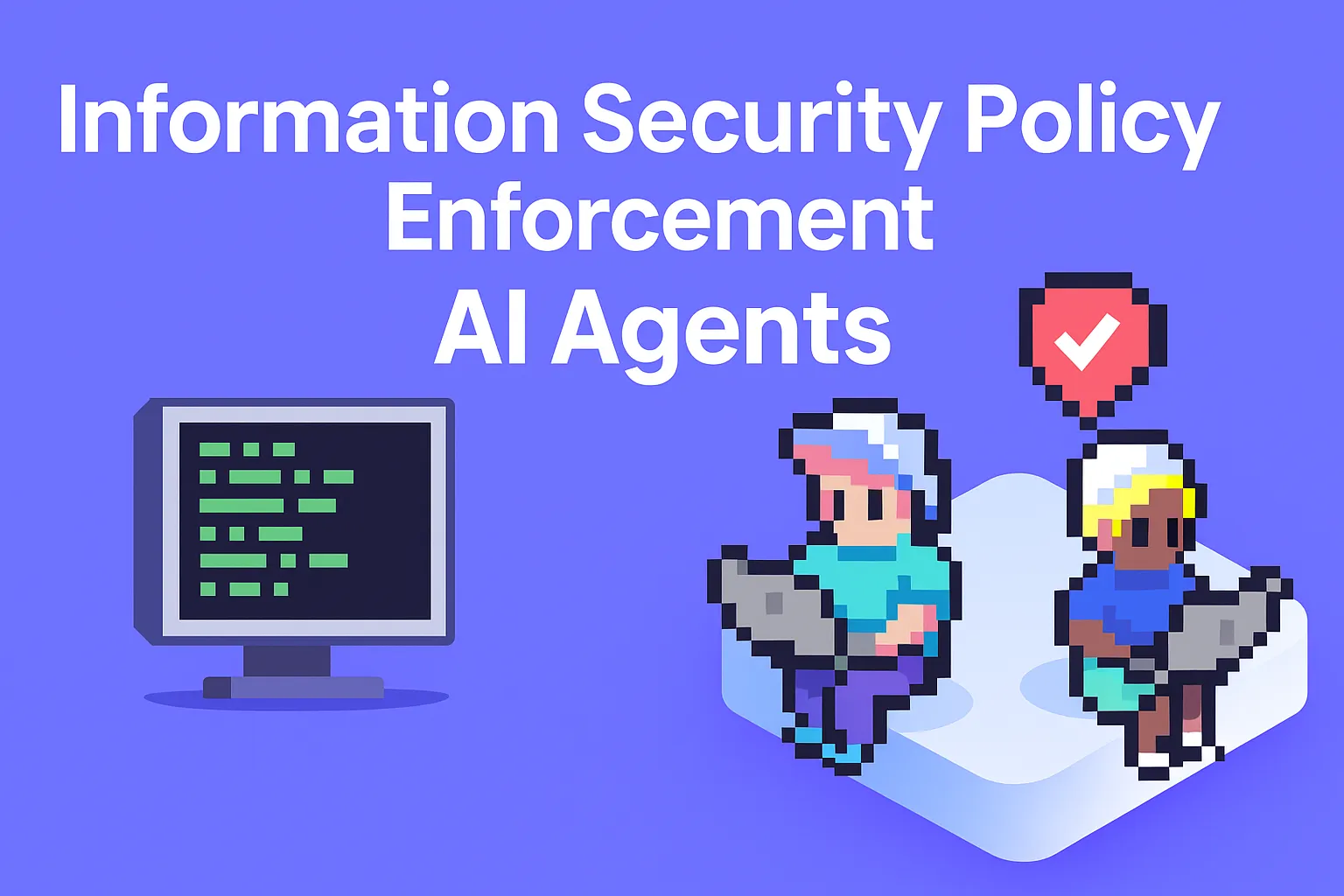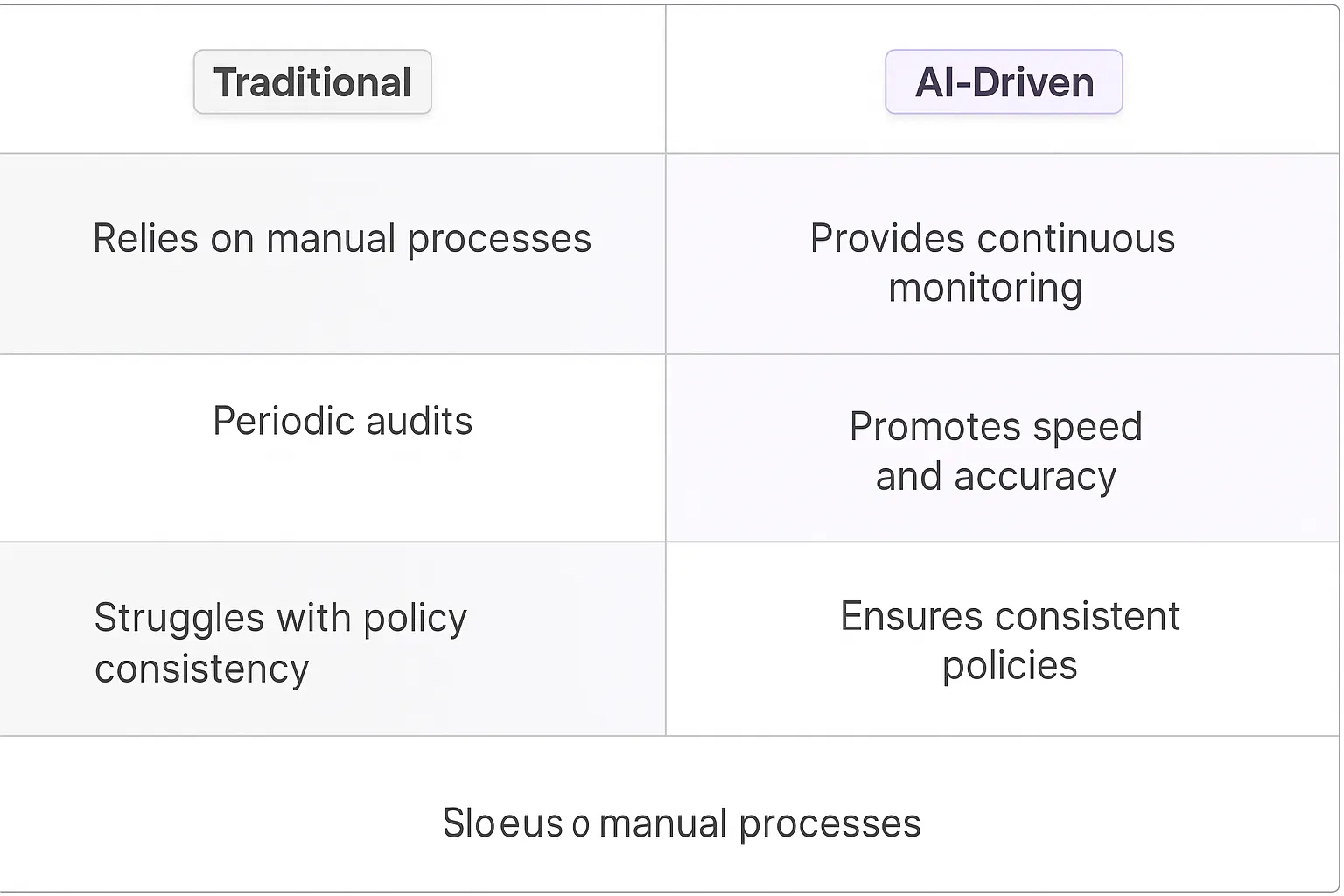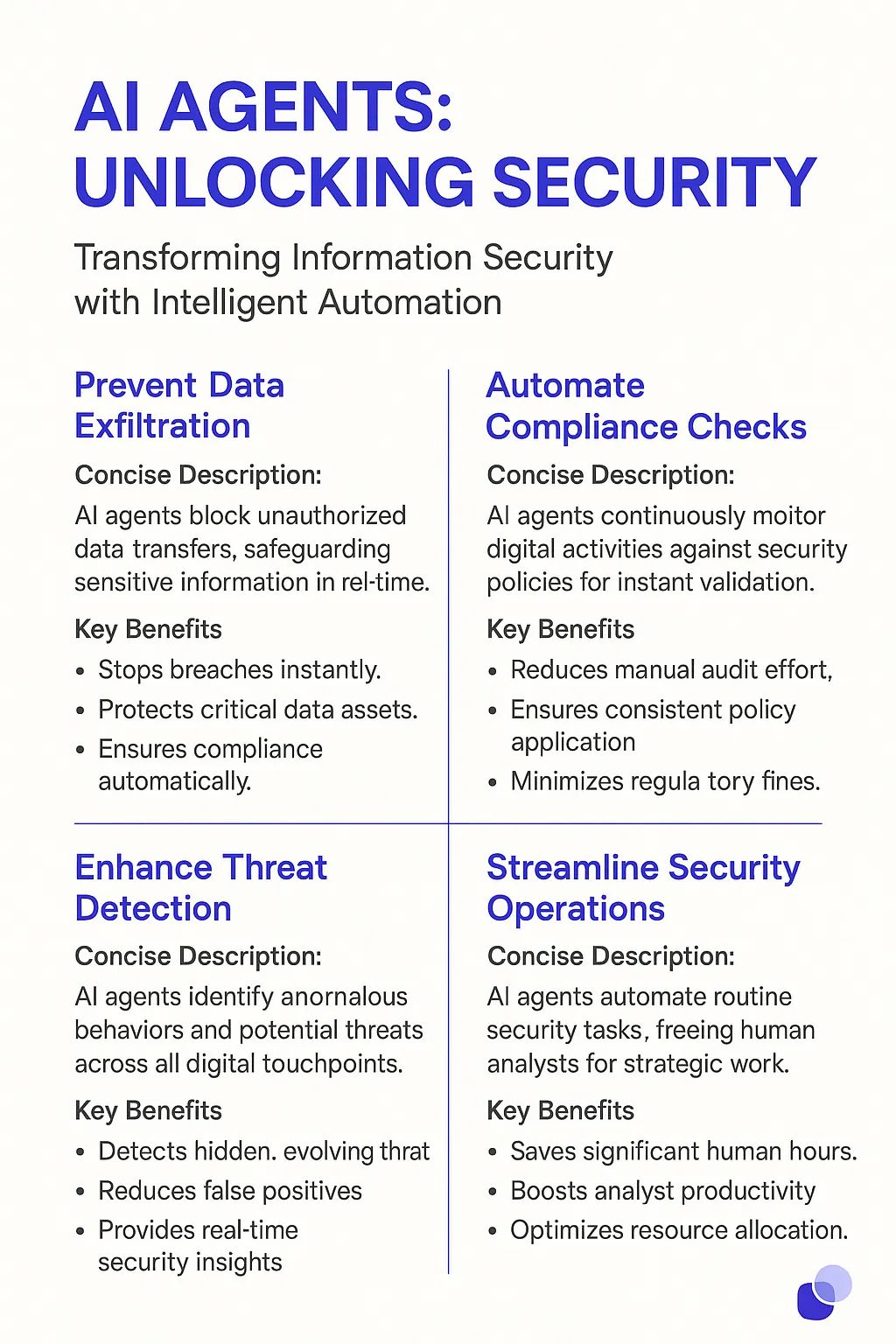Information Security Policy Enforcement AI Agents
Understanding Information Security Policy Enforcement
What is Information Security Policy Enforcement?
Information Security Policy Enforcement is the systematic implementation and monitoring of rules and guidelines designed to protect an organization's digital assets. It's the digital equivalent of a security guard, but instead of patrolling physical premises, it oversees networks, data, and user activities. This process ensures that all members of an organization adhere to established security protocols, from password policies to data handling procedures. It's not just about setting rules; it's about actively ensuring they're followed, identifying violations, and responding to potential threat detection in real-time.
Key Features of Information Security Policy Enforcement
The core features of Information Security Policy Enforcement include continuous monitoring of user activities and system behaviors, real-time threat detection and response, policy compliance checks, and automated enforcement actions. It involves analyzing vast amounts of data from various sources, correlating events to identify potential security breaches, and taking immediate action to mitigate risks. Advanced systems leverage machine learning to adapt to new threats and improve detection accuracy over time. They also provide detailed audit trails and reports, crucial for regulatory compliance and incident investigations.

Benefits of AI Agents for Information Security Policy Enforcement
What would have been used before AI Agents?
Before AI agents entered the scene, information security policy enforcement was a manual, time-consuming process. Security teams relied on a combination of static rule-based systems, periodic audits, and human oversight to ensure compliance. This approach was not only slow but also prone to human error and inconsistencies. Companies often struggled with the sheer volume of data and the complexity of modern IT environments, leading to gaps in security coverage and delayed responses to potential threats.
What are the benefits of AI Agents?
AI agents are game-changers for information security policy enforcement. They bring a level of speed, accuracy, and adaptability that traditional methods simply can't match. These digital teammates operate 24/7, continuously monitoring network traffic, user behavior, and system logs for any signs of policy violations or security breaches.
One of the most significant advantages is their ability to learn and improve over time. Unlike static rule-based systems, AI agents can identify patterns and anomalies that humans might miss, adapting their enforcement strategies based on new threats and evolving attack vectors. This dynamic approach to security policy enforcement is crucial in today's rapidly changing threat landscape.
AI agents also excel at handling the massive scale of data in modern enterprises. They can process and analyze vast amounts of information in real-time, allowing for immediate detection and response to potential security incidents. This speed is critical in minimizing the impact of breaches and maintaining robust security postures.
Moreover, these AI-powered enforcers bring consistency to policy application across the organization. They eliminate the variability that comes with human judgment, ensuring that security policies are applied uniformly across all systems and users. This consistency is key to maintaining compliance with industry regulations and internal standards.
Another often-overlooked benefit is the reduction of alert fatigue among security teams. AI agents can prioritize and contextualize security events, presenting only the most critical issues to human analysts. This allows security professionals to focus their expertise on high-impact tasks rather than getting bogged down in routine checks and false positives.
Lastly, AI agents provide valuable insights for continuous improvement of security policies. By analyzing enforcement patterns and outcomes, they can suggest refinements to existing policies and even identify areas where new policies may be needed. This proactive approach to policy management helps organizations stay ahead of emerging threats and adapt their security strategies accordingly.
In essence, AI agents are not just tools but strategic assets in the realm of information security policy enforcement. They augment human capabilities, providing a level of vigilance, speed, and adaptability that is essential in today's complex digital ecosystems. As these digital teammates continue to evolve, they'll play an increasingly central role in shaping the future of cybersecurity.

Potential Use Cases of AI Agents for Information Security Policy Enforcement
Processes
Information security policy enforcement is a critical yet often overlooked aspect of organizational cybersecurity. AI agents are poised to transform this space, bringing a level of consistency and vigilance that human teams struggle to maintain. These digital teammates can continuously monitoring systems, analyze patterns, and enforce policies in real-time, creating a more robust security posture.
One key process where AI agents excel is in the continuous assessment of user behavior against established security policies. By ingesting vast amounts of data from various touchpoints - login attempts, file access patterns, network traffic - these agents can build comprehensive user profiles. They can then flag anomalies that may indicate policy violations or potential security breaches, allowing security teams to focus on high-priority issues rather than drowning in a sea of alerts.
Another critical process is the dynamic updating of security policies based on emerging threats. AI agents can analyze threat intelligence feeds, internal incident reports, and global security trends to recommend policy adjustments. This adaptive approach ensures that an organization's security posture remains relevant and effective against evolving cyber threats.
Tasks
At a more granular level, AI agents can handle a variety of specific tasks in information security policy enforcement:
- Real-time monitoring of access control lists (ACLs) and immediately revoking unnecessary privileges
- Automated enforcement of password policies, including complexity requirements and regular password rotations
- Continuous scanning of network traffic for policy violations, such as the use of unsanctioned applications or services
- Intelligent analysis of data transfer patterns to prevent data exfiltration attempts
- Automated patch management to ensure all systems comply with the latest security standards
- Contextual analysis of user actions to detect and prevent insider threats
These AI-driven tasks create a layered defense that's both proactive and reactive, significantly enhancing an organization's security posture.
The integration of AI agents into information security policy enforcement isn't just an incremental improvement - it's a paradigm shift. We're moving from a world of static, manually enforced policies to one of dynamic, intelligently applied security measures. This transition will be as impactful as the shift from on-premise to cloud computing, fundamentally changing how organizations approach cybersecurity.
However, it's crucial to remember that AI agents are tools, not silver bullets. Their effectiveness depends on proper implementation, ongoing training, and human oversight. The most successful organizations will be those that find the right balance between AI capabilities and human expertise, creating a symbiotic relationship that leverages the strengths of both.
As we look to the future, the role of AI in information security will only grow. We can expect to see more sophisticated agents capable of not just enforcing policies, but also predicting potential security issues before they occur. This predictive capability, combined with automated response mechanisms, could create self-healing security systems that adapt and evolve in real-time to counter threats.
The companies that embrace this AI-driven approach to information security policy enforcement will gain a significant competitive advantage. They'll be able to operate with greater confidence in increasingly complex digital environments, focusing on innovation and growth while their AI teammates handle the heavy lifting of security policy enforcement.

Industry Use Cases: AI Agents in Information Security Policy Enforcement
AI agents are becoming indispensable in the realm of information security policy enforcement, offering a level of vigilance and adaptability that's hard to match with traditional methods. Their ability to process vast amounts of data, learn from patterns, and make split-second decisions makes them particularly suited for this critical aspect of cybersecurity.
Let's dive into some industry-specific scenarios where AI agents are making a significant impact. These examples aren't just theoretical - they're real-world applications that are changing the game for businesses across various sectors. From finance to healthcare, AI agents are redefining how we approach information security policy enforcement.
What's particularly exciting is how these AI-driven solutions are not just improving security, but also freeing up human experts to focus on more complex, strategic tasks. It's a shift that's subtly but profoundly changing the landscape of information security.
So, let's explore how different industries are leveraging AI agents to enforce their information security policies more effectively and efficiently. These use cases will give you a concrete idea of the transformative potential of AI in this critical area of cybersecurity.
Financial Services: Fortifying the Digital Fortress
The financial services industry is a prime target for cybercriminals, making it an ideal candidate for Information Security Policy Enforcement AI Agents. These digital teammates can significantly enhance the security posture of banks, investment firms, and insurance companies.
Consider a large multinational bank with thousands of employees across different time zones. Traditionally, enforcing information security policies consistently has been a Herculean task, often leading to gaps in protection. Enter the AI Agent – a tireless guardian of digital assets.
This AI-powered enforcer continuously monitors employee activities, from email communications to file transfers and database access. It's not just about flagging suspicious behavior; it's about proactively preventing breaches before they occur.
For instance, if an employee attempts to send an unencrypted file containing sensitive customer data, the AI Agent immediately intercepts the action. It doesn't just block the transfer – it educates the employee on the spot about the policy violation and guides them through the correct procedure.
But that's just the tip of the iceberg. These AI Agents can adapt to evolving threats in real-time. They analyze patterns of behavior across the organization, identifying potential vulnerabilities before they're exploited. If a series of unusual login attempts occurs across different branches, the AI can correlate these events and trigger a system-wide alert, potentially thwarting a coordinated attack.
The real game-changer is the AI's ability to learn and improve over time. As it encounters new scenarios and threats, it refines its enforcement strategies. This means the bank's security posture isn't static – it's constantly evolving, always one step ahead of potential breaches.
For financial institutions, where trust is currency, these AI Agents aren't just tools – they're essential partners in maintaining the integrity of the financial ecosystem. They're the silent sentinels that allow banks to innovate and expand their digital offerings without compromising on security.
In an industry where a single breach can cost millions and shatter customer trust, Information Security Policy Enforcement AI Agents are more than just a technological advancement – they're a competitive necessity. They're transforming how financial institutions approach security, moving from reactive to proactive, from rigid to adaptive, and from human-dependent to AI-enhanced.
Manufacturing: Safeguarding the Smart Factory
The manufacturing sector is undergoing a seismic shift with Industry 4.0, but this digital transformation comes with its own set of cybersecurity challenges. Information Security Policy Enforcement AI Agents are becoming the unsung heroes in this new era of smart factories.
Take a large automotive manufacturer with multiple plants across the globe. Their production lines are now interconnected, with IoT devices and sensors feeding real-time data to centralized systems. This connectivity is a double-edged sword – it boosts efficiency but also expands the attack surface exponentially.
AI Agents in this environment act as vigilant overseers, monitoring every data point and network interaction. They're not just looking for malware or unauthorized access; they're ensuring that every piece of machinery, every sensor, and every employee interaction adheres to stringent security protocols.
When a technician on the factory floor tries to update the firmware on a robotic arm using an unverified source, the AI Agent springs into action. It doesn't just block the update – it initiates a real-time education module, explaining the risks of unofficial firmware and guiding the technician through the correct verification process.
These digital teammates are particularly crucial in managing the complex supply chain networks typical in manufacturing. They monitor communications with suppliers, flagging any attempts to share proprietary design files or production data through unsecured channels. By learning the normal patterns of data flow between the manufacturer and its partners, the AI can spot anomalies that might indicate a supply chain attack in its early stages.
What's truly game-changing is how these AI Agents adapt to the unique rhythms of each production line. They learn to distinguish between normal variations in machine behavior and potential security threats. For instance, if a CNC machine suddenly starts sending data packets at odd hours, the AI can correlate this with production schedules and maintenance logs to determine if it's a legitimate activity or a potential breach.
The AI's ability to enforce policies across diverse systems – from legacy equipment to cutting-edge IoT devices – is a massive advantage. It creates a unified security posture that's often elusive in the fragmented world of industrial control systems.
For manufacturers, where downtime can cost millions and IP theft can erase competitive edges, these AI Agents are becoming as essential as the machines on the production line. They're not just protecting data; they're safeguarding the very foundations of modern manufacturing.
In an industry racing towards full automation and digital integration, Information Security Policy Enforcement AI Agents are the key to maintaining trust in the system. They're enabling manufacturers to push the boundaries of innovation while keeping their digital fortresses impregnable. It's not just about preventing breaches; it's about building a resilient, secure foundation for the future of manufacturing.
Considerations for Information Security Policy Enforcement AI Agents
Technical Challenges
Implementing an AI agent for information security policy enforcement is like trying to build a digital immune system for your organization. It's complex, ever-evolving, and requires constant adaptation. One of the biggest technical hurdles is creating a system that can understand and interpret the nuances of human behavior in the context of security policies.
Think about it: how do you teach a machine to differentiate between a legitimate file transfer and a potential data exfiltration attempt? It's not just about pattern matching; it's about understanding intent, context, and the subtle variations in user behavior. This requires sophisticated machine learning models that can process vast amounts of data in real-time, while continuously learning and improving.
Another technical challenge is integrating the AI agent with existing security infrastructure. Most organizations have a patchwork of security tools and systems. Getting an AI agent to play nice with legacy systems, firewalls, intrusion detection systems, and identity management solutions is like trying to get a cutting-edge smartphone to communicate with a rotary dial telephone. It's possible, but it's going to take some serious engineering gymnastics.
Operational Challenges
On the operational side, implementing an AI agent for security policy enforcement is like introducing a new team member who speaks a different language and operates on a different time zone. The first hurdle is training your human security team to work alongside this digital teammate. It's not just about learning new tools; it's about fundamentally changing how security operations are conducted.
There's also the challenge of managing false positives and negatives. An overzealous AI agent could flood your security team with alerts, turning your SOC into a digital version of the boy who cried wolf. On the flip side, an overly cautious agent might miss critical security breaches. Finding the right balance requires constant tuning and a deep understanding of both the AI's capabilities and the organization's risk tolerance.
Let's not forget about the human element. Employees might view the AI agent as Big Brother, constantly watching over their digital shoulders. This could lead to resistance, attempts to circumvent the system, or even a decline in productivity as people become overly cautious about their digital activities. Managing this cultural shift is crucial for the success of any AI-driven security initiative.
Lastly, there's the ongoing challenge of keeping the AI agent up-to-date with the latest threats and attack vectors. The cybersecurity landscape is like a game of whack-a-mole on steroids. As soon as you've patched one vulnerability, three more pop up. Ensuring your AI agent can keep pace with this ever-changing threat landscape is a never-ending operational challenge that requires constant vigilance and resources.
The Future of Cybersecurity: AI-Driven Adaptive Defense
Information Security Policy Enforcement AI Agents are not just a technological upgrade; they're a paradigm shift in cybersecurity. They're transforming static, reactive security measures into dynamic, proactive defense systems. These AI-powered guardians are enabling organizations to navigate the complexities of modern digital landscapes with unprecedented confidence and agility. As cyber threats evolve, so do these digital teammates, constantly learning and adapting to stay ahead of attackers. The future of cybersecurity isn't just about building stronger walls; it's about creating intelligent, adaptive systems that can anticipate and neutralize threats before they materialize. Organizations that embrace this AI-driven approach will not only enhance their security posture but also gain a significant competitive edge in an increasingly digital world.













